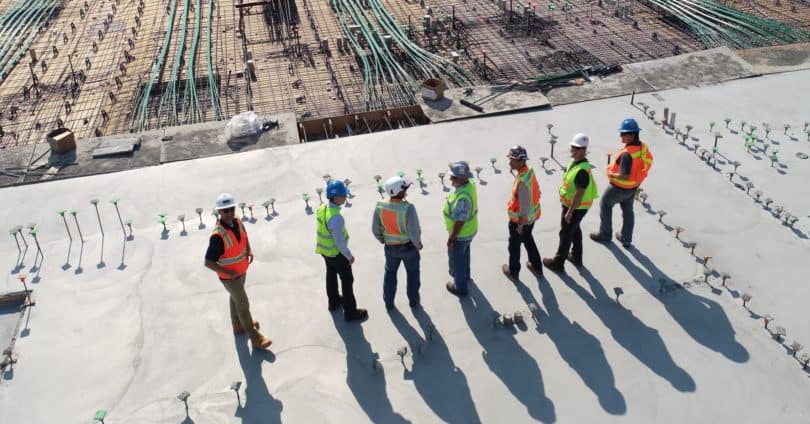Successful projects are typically the result of careful planning, talents, and collaboration between the team members of a project. Projects can’t move forward without each of their key team members, but it’s not always clear who they are or what roles they play. Here we will describe all the roles – project manager, project team member, project sponsor, QS Engineer, and Planning Engineer, etc. – and their related duties. Following are the construction Project Team Duties and Responsibilities.
Duties and Responsibilities For Construction Project Team
1.Client
The person or group that requests the project. The person or group to whom the project has been completed. The client is responsible for setting out the details of their project request: objectives, objectives, specifications, and outcomes. After completion of the project, the client becomes the owner of the product produced by the project.
Traditionally, the customer had a relatively nominal direct involvement in construction work, but the role of the project manager in managing the expectations of the client also expands with an increasingly large number of client project teams. There is now a greater emphasis on the client being more involved during the construction phase.
Client Duties
- The progress of the work is to be scheduled in a logical way.
- Ensure that the quality of the construction is acceptable, taking advice from the project manager, where appropriate.
- Understanding the potential impact of changes on the progress of the construction phase.
- Managing internal stakeholders in decision-making to assist with site progress.
- Ensure security, environmentally sustainable, and safe working practices are adopted.
- Ensuring that the obligation to pay all monies certified for payments to consultants and contractors is fulfilled.
- Satisfying themselves that the performance of the contractor is in line with the contract.
2.Project Manager
The project manager plays a key role in the project and is responsible for the successful delivery of the project. The role of the manager is to ensure that the project continues within the timeline and within the budget set, while at the same time achieving its objectives. Project managers ensure that sufficient resources are provided to projects while managing relations with contributors and stakeholders.
Project Manager Duties
- Ensuring the preparation and issuance of contract documents to the contractor.
- Ensuring all the contracts are signed.
- Reviewing the contractor’s working programme and method statements.
- Ensuring that the resources of the contractor are adequate and appropriate.
- Ensuring that procedures are in place and followed.
- Develop a project plan.
- Ensuring that site meetings are held and documented.
- Manage deliverables in accordance with the plan.
- Monitoring the cash flow of the project.
- Reviewing progress with the contractors.
- Monitoring performance of the contractors.
- Manage and lead the project team.
- Ensure that the design information needed by the contractor is provided by consultants.
- Ensure that the health and safety file of the construction process is maintained.
- Establish environmental sustainability, time, cost, and quality control systems.
- Determine the methodology used for the project.
- Assign tasks to members of the project team.
- Ensure site inspections are carried out.
- Give regular updates to the top management.
- Managing the cost plan for the project.
- Ensure that the client fulfills contractual obligations (i.e., payments)
- Reporting to the client.
- Managing the introduction of changes.
- Making sure regulatory approvals are received.
- Review construction risks.
3. Project Sponsor
The Executive (AVP ‘Assistant Vice President’ or above) is the Project Sponsor with a demonstrable interest in the outcome of the project and who is ultimately responsible for securing funding and resources for the project. It does not have to be a single person.
The project manager is the project’s driver and advocates in-house. We are usually senior management leaders-anyone with an interest in the success of the project. Project Sponsors work closely with the project manager. They legitimize the project’s objectives and participate in high-level project planning. In addition, they often help resolve conflicts and remove barriers that occur throughout the project, and sign the approvals needed to advance each phase.
Project Sponsor Duties
- Approve the budget of the project.
- Take key business decisions for the project.
- Ensure availability of resources.
- Communicate the objectives of the project throughout the organization.
- Oversee high level project progress.
- Approve project completion.
- Resolve any organizational policy issues as they arise (including budget)
- Ongoing consultation and support for project development.
4. Design Team
The design team composed of an architect and engineers for construction projects. The team itself may often consist of an architectural firm and an engineering company which employs many architects or engineers themselves. You can actually have one architect or engineer who is entrusted with your project on smaller projects. Each of these groupings may have individuals specializing in a specific design or engineering areas.
Design Team Duties
- Providing production information (i.e. details of building components)
- Commenting and approving working drawings being provided by specialist contractors.
- Responding to the contractor’s site queries.
- Inspection of the works to check the drawings and the specifications.
- The inspection of the works has been achieved to check an acceptable quality standard.
- issuing of design information.
- issuing of variations.
- instructions on standards of work & working methods.
5.Quantity Surveyor
The role of a quantity surveyor is to manage costs related to construction and engineering projects. This may include new construction work, renovations or maintenance work. From early design costs to final numbers, quantity surveyors aim to reduce project costs and maximize value for money by ensuring that the project meets all the criteria and regulations for legal and quality control.
Quantity Surveyor Duties
- Prepare tender documents, budgets, contracts, bills of quantities, and other documentation.
- Tender administration-Assessment of the bids submitted and selection of the project ‘s best contractor.
- Carrying out feasibility studies for estimating materials, time, and labor costs.
- Price/project cost of the various materials required for the project.
- Valuation of completed work and payment arrangements.
- Track design and/or construction changes, and adjust budget forecasts accordingly.
- Measure the work done on-site and value it.
- Prepare subcontractors’ payments/invoices.
- Select construction materials and/or source materials.
- Using Bills of Quantities for cost control.
- Preparing Bills of Remeasurements.
- Preparing the Final Account.
6.Planning Engineer
The role of the Planning Engineer for Construction Projects varies with the stakeholders who work for it. Like PMC-Project Management Consultant, EPC-Engineering, Procurement Construction, Main Contractor, or Sub-Contractor.
Planning Engineer Duties
- Understand project specifications and develop schedules that meet them.
- Preparation of Project Programme/Schedule (Software used: Primavera, MS Project, etc.,) covering the entire scope and within defined timelines.
- Plan the appropriate budget and create different budget headings to track and monitor expenditure.
- Calculation of Optimal Material Requirement, Manpower Requirement (of different trades) & Machinery Requirement.
- Create a Cashflow analysis.
- Coordinate with different departments such as Engineering (which offers work drawings), Procurement (which purchases materials), Contracts (which grants contracts and causes any problems with the customer), Performance (which maintains) & Commissioning departments.
- Collect periodic updates ( and Updating the Baseline Programme) and prepare daily, weekly and monthly reports of the project.
- Create variance reports (Schedule Variance and Cost Variance), usually Earned Value Method (EVM) is used to analyze deviations at different stages of the project.
- Highlight all the delayed activities.
- Monitor and Follow up with the contractors & subcontractors against planned scheduled activities.
- Highlight issues related to construction which cause time delays.
- Coordinate weekly progress meetings with Clients, Contractors & subcontractors.
- Preparation of mitigation or recovery plan, remaining works programme other detailed micro schedule depending on the PMC/Client requirement.
- Submitting the EOT Claim to the Client/Consultant. (For Contractors)
- Reviewing the Submitted EOT Claim. (For PMC, Consultant & Client)
See Also
Planning Engineer Interview Questions & Answers
Civil Engineer Interview Questions & Answers









